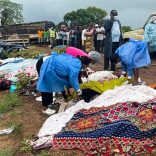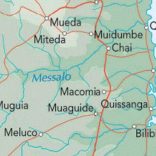Mozambique: Six people die in Nicoadala crash
Heroin traffickers and some politicians have a consolidated relationship in Mozambique – Read the full study

Photo: ENACT Africa
An analyst, co-author of a study on trans-national organised crime, believes that Mozambique has a consolidated criminal economy, involving heroin traffickers in a “long-standing relationship” with members of the political elite.
“Mozambique has a highly consolidated criminal economy around a handful of key figures involved in the heroin routes,” says Simone Haysom, an analyst with the organisation Global Initiative against Transnational Organised Crime and co-author of a report by the Enact project, which is funded by the European Union.
Haysom was speaking during a debate in Maputo on Wednesday on a research paper entitled ‘The Heroin Coast’, co-authored with Peter Gastrow and Mark Shaw and launched in June 2018.
There are indications that “there may be small destabilisations” among those involved in illicit business, “but for more than two decades there has been a long-standing relationship between a small number of prominent traffickers and the political elite, which has allowed them to close the [Mozambican] market to other operators,” Haysom added, without going into further detail.
In this case, Mozambique acts as a corridor for the trafficking of heroin from Asia to South Africa, and from there to the final destinations, such as Europe, where illicit networks obtain the greatest profits.
Kenya, for example, “has a more dynamic political environment”, while Mozambique is “more static”, with links between political and drug trafficking networks “longer, stronger and harder to break”, Haysom says.
The northern coast of Mozambique is the preferred entry-point for heroin, for its various weaknesses and because of the control exercised by criminal organisations.
Haysom says that, while there may be “ad-hoc agreements” between traffickers and the perpetrators of attacks that have killed at least 150 people in remote locations in Cabo Delgado, there is no systematic relationship.
READ THE FULL ENACT STUDY HERE: Tackling heroin trafficking on the East African coast
Abdul Carimo, a former judge, Mozambican Liberation Front (Frelimo) deputy and author of the 1997 law – still currently in force – which penalises narcotics trafficking and consumption, argued at the debate that the problem was to move from words to deeds.
The introduction of the law “did not provoke a significant increase in the fight against, or a reduction in the use of, the drug”, he says, reasoning that “everything has to do with the fragility of the institutions, the traffickers’ capacity for bribery, the impunity and the large amounts [of money] associated with the traffic, which corrupt everything and everyone,” he told Lusa.
Carimo recalled a recent intervention by the Mozambican prime minister, Carlos Agostinho do Rosário, who appointed a new director to the Central Office to Combat Drugs, asking for a “strategic plan” within 90 days.
“It is not enough that there is political will; it must be translated into concrete acts,” he added, referring to expectations for the new strategic plan.
The study debated in Maputo on Wednesday warned in 2018 that it was more difficult to get heroin to its destination via Central Asia and Eastern Europe, causing a rise in trafficking through the so-called “southern route”, which includes Mozambique.
The document indicates that a gram of heroin costs about US$20 in Kenya, about US$60 in the United Kingdom and up to US$213 in Denmark. Researchers are unable to put a figure on the annual heroin trade in Mozambique, but give a broad estimate of between 10 and 40 tonnes.
The study was conducted under the Enact project, “Enhancing Africa’s Response to Transnational Organised Crime”, which is implemented by the Institute for Security Studies and Interpol with the participation of the Global Initiative against Transnational Organised Crime and funding from the European Union.
Spoke to a packed room in Maputo today about heroin trade in the region. There was a huge appetite to talk about corruption, dirty money, and its possible link to the conflict in CdG. Proud of @GI_TOC and @ENACT_Africa for shining a spotlight into the shadows.
— Simone Haysom (@simonehaysom) March 13, 2019
Report launch in Maputo: Officially-recorded #heroin seizures have been insignificant in #Mozambique https://t.co/hbyCP1qP9v @GI_TOC pic.twitter.com/Wwt6iMl49d
— ISS (@issafrica) March 13, 2019
‘Business, politics and crime are closely intertwined in the illicit drug trade’ – @GI_TOC’s Peter Gastrow https://t.co/YlfgnrDhg4pic.twitter.com/VnsZLaokzI
— ISS (@issafrica) March 13, 2019












Leave a Reply
Be the First to Comment!
You must be logged in to post a comment.
You must be logged in to post a comment.